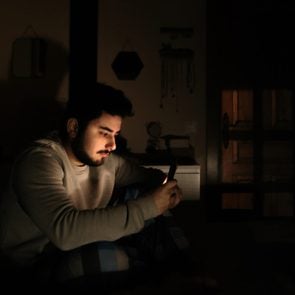How to Stop Procrastinating
Updated: Jul. 14, 2022
We're all familiar with this urge to procrastinate, but why do we put something off even when we know there will be consequences?
What is procrastination?
Whether it’s that load of laundry growing in the corner of your bedroom or an email from your colleague you “keep meaning to get to,” everyone’s guilty of procrastinating.
It’s an urge many of us give in to even when the stakes are higher. A survey by the financial company IPX 1031 found that in 2020, at least 33 percent of Americans waited until the last minute to do their taxes. And that’s after the U.S. government itself pushed the filing deadline from April to May.
Still, this tendency goes beyond poor time management or laziness. According to research published in Frontiers in Psychology, there are two main features of procrastination:
- We unnecessarily and intentionally put something off.
- We know we’ll be worse off for delaying.
This awareness of the negative consequences we’ll face is why scientists link procrastination with our emotions—and how much we let those emotions control our behavior.
Research in the journal Social and Personality Psychology Compas found that when we procrastinate, we’re giving in to our desire for immediate gratification. By putting off something that makes us feel bad, we’re “prioritizing our current mood over the consequences of inaction for our future self.”

What is chronic procrastination?
It’s one thing to procrastinate from time to time due to external stressors like a busy schedule, says Lauren Cook, PhD, a clinical psychologist and founder of Heartship Psychological Services in California. “But when it becomes a generalized pattern no matter what, that’s a sign that procrastination may have become chronic.”
We’ve all faced repercussions for putting off a task, whether it’s missing a deadline or letting that dental cavity progress a little too far.
Yet Joyce Marter, LCPC, licensed psychotherapist and author of The Financial Mindset Fix: A Mental Fitness Program for an Abundant Life, points to some tell-tale behaviors of chronic procrastinators:
- perpetually feeling like you’re behind and often disappointing others
- having people in your life frustrated with you—which can lead to repeated job or relationships losses
- becoming defensive over your task avoidance, like blaming others or leaning on excuses
- struggling with feelings of inadequacy
- feeling overwhelmed by deadlines and responsibilities
- filling your time with minor, less important tasks
Chronic procrastinators may also have people in their lives enabling this behavior, either by completing tasks, constantly offering reminders, or trying to help them better manage their time. And to the procrastinator, this support is often unwelcome.
“You may experience these people as controlling and resent them,” Marter explains.
What causes chronic procrastination?
Another defining feature of chronic procrastination? Once you’re caught in the cycle, it’s tough to break free.
A study published in the Journal of Rational-Emotive & Cognitive-Behavior Therapy found that negative feelings like stress, anxiety, low self-esteem, and imposter syndrome are what lead to procrastination—making task avoidance a coping mechanism for handling these difficult emotions.
Then when we put something off, we experience a momentary sense of relief. That response activates our brain’s reward center, reinforcing the habit.
But procrastinating also gets ingrained into our body’s stress response. That means the next time we’re faced with a task that makes us feel anxious, insecure, or frustrated, our body clocks it as a threat. Procrastination then steps in as our defense mechanism against these threatening emotions.
It looks like this:
- We have a task at hand.
- We consider how the task will make us feel.
- We conclude the task will make us feel stressed, insecure, or experience some other bad emotion.
- Our body aims to avoid those bad feelings, so we avoid the task.
- We feel more stressed by delaying a task—and the procrastination cycle continues.
This emotional hook is why Marter says chronic procrastination often results from:
Behavioral health issues
Mental health conditions like anxiety, depression, substance misuse, addiction, attention deficit/hyperactivity disorder (ADHD,) and trauma can contribute to procrastination.
“Each of these impairs our cognitive functioning and ability to think clearly, concentrate, organize oneself, and make decisions,” Marter says.
Mental health issues also often lead to emotional overwhelm—when the intensity of your (typically negative) feelings outpaces how well you can manage them. This overwhelm can fuel negative self-talk and cognitive distortions while decreasing your motivation and energy levels, all of which can lead to procrastination.
Fear
Whether you fear success, failure, judgment, or admitting that you don’t know how to do something, any form of uncertainty or doubt can paralyze your ability to act.
Or you might worry about the consequences of completing a task, Marter says. For example, it’s easier to delay having a tough conversation if you’re concerned about the other person’s reaction.
Perfectionism
“I’ve seen many people procrastinate on taking action in areas that would further their careers and financial prosperity because they want their résumé, business plan, website, or proposal to be perfect before they launch it into the world,” Marter says.
But when we strive for perfection, we wind up constantly shifting the goalposts—leading to delayed results, increased frustration, and often, more procrastinating.
Does procrastination harm our health?
That fleeting satisfaction we feel when procrastinating comes at a cost.
“The negative emotions you associate with a given task don’t go away when you avoid that task,” says Haley Perlus, a PhD in sports and performance psychology. “They feed on themselves and multiply.”
The mental toll of procrastination
It’s not just the stress surrounding a task that mounts as deadlines loom. The study in the Journal of Rational-Emotive & Cognitive-Behavior Therapy describes how chronic procrastination leads to lower self-esteem and works to increase someone’s overall stress and anxiety.
These findings hinge on what are called “procrastinatory cognitions,” or negative thought patterns that accompany task avoidance—like shame, guilt, failure, and self-doubt.
They’re also why procrastination can quickly become a vicious cycle.
“The more we procrastinate, the more we doubt our ability to successfully complete tasks,” Dr. Cook says. “This can chip away at our confidence.”
Procrastination’s impact on our physical health
From a practical perspective, putting off a visit to the doctor or dentist also delays necessary medical treatments.
Yet, research from Personality and Individual Differences found that chronic procrastinators are also less likely to practice wellness-oriented behaviors in general, like maintaining a good diet and physical activity level.
Marter says the stress and anxiety that procrastination triggers can have physical effects throughout the body as well, like insomnia, changes in eating habits, gastrointestinal problems, headaches, and increased blood pressure.
These physical symptoms of chronic stress and anxiety can make someone vulnerable to more serious health problems as well. A recent study published in the Journal of Behavioral Medicine linked chronic procrastination with a greater risk of both cardiovascular disease and hypertension.

How can I stop procrastinating?
“Long-term procrastination can create a loop, where putting something off reinforces your desire to do it again, even if it’s creating more problems,” Dr. Perlus says.
But because chronic procrastination is rooted in our emotional response, downloading yet another time management app may not be enough to close this loop.
Instead, a study published in Learning and Individual Differences found that kicking the procrastination habit comes down to regulating our emotions—specifically, learning how to tolerate negative emotions and modifying our responses.
The experts say this emotional regulation is a process that takes time, but to start with strategies like:
Practice self-compassion
“When learning to change your habits, you should first forgive yourself and allow yourself compassion,” Dr. Perlus says. “That way, you don’t let self-blame take over.”
A study published in Self and Identity found that people who procrastinate tend to demonstrate lower levels of self-compassion. But when people are able to forgive themselves for this delay, they’re likely to procrastinate less in the face of their next stressful task, according to another study from Personality and Individual Differences.
“Being hard on yourself will just create a downward spiral of frustration and feelings of inadequacy,” Marter explains. That’s why feeling bad about your procrastination just deepens the cycle, making it even harder to change the habit.
Incentivize yourself
When we have a task at hand that makes us feel anxious, not good enough, or even just bored, it’s gratifying to delay those negative feelings. This relief is what tempts us to procrastinate again and again, especially as the stress of putting something off compounds.
But by hijacking this reward cycle, we can replace the perceived benefit of procrastinating with more productive incentives.
“Reward yourself for completing tasks on time with quality time for yourself to focus on self-care or to do something you really enjoy,” Marter says. “You might even ask loved ones to help you with incentives, such as being able to watch a show together when you complete your project.”
Challenge false thought patterns
“You can also try and derail cognitive distortions, or patterns of irrational and inaccurate thoughts,” Dr. Perlus says.
These negative thought patterns contribute to conditions like anxiety and depression, according to research from Europe’s Journal of Psychology. Over time, cognitive distortions can even become automatic thoughts, shaping our core beliefs—so even a neutral or positive event might spur anxiety, stress, and procrastination.
Here’s how common cognitive distortions can influence procrastination:
- Perfectionism: You avoid starting or completing a task because you’re afraid of making a mistake.
- Catastrophizing: You believe you’ll never be qualified for a certain job, so you put off preparing your résumé and applying.
- Overgeneralizing: You received bad feedback on a past assignment, so you assume you’ll fail at all future tasks, too.
- Discounting the positive: You focus on one bit of negative feedback during an otherwise glowing performance review.
“Try and come up with different explanations that help you reframe situations that may lead you to a hostile place,” Dr. Perlus says.
Practice mindfulness strategies
Marter says mindfulness practices like meditation, deep breathing, and yoga help us stop ruminating about the past or worrying about the future—facilitating mental calm and clarity in the here and now.
“The result is like rebooting your computer operating system,” she says. This can help us unravel negative, anxious thought patterns that trigger procrastination.
Accept responsibility (and if needed, extra support)
“Avoid the urge to blame your boss, your partner, or the weather,” Marter says. “Own up to your chronic procrastination and commit to addressing it just like you would if you had a physical health problem.”
This could mean creating systems of accountability, like asking your family, friends, or co-workers to check in with you about your progress on certain tasks and responsibilities.
But when a cycle of procrastination starts to affect your daily life, affects your relationships, or harms your mental health, it might be time to get some extra support.
“Consider having a mental health checkup to see if conditions such as depression or ADD/ADHD might be contributing to your procrastination problem,” Marter says.
Through strategies like cognitive behavioral therapy, a professional can also help you work through identifying and reframing irrational thought patterns at the root of your procrastination pattern.
Get The Healthy @Reader’s Digest newsletter for what’s happening in health and wellness in your inbox each morning. Follow us on Facebook, Instagram, and Twitter, and keep reading:



